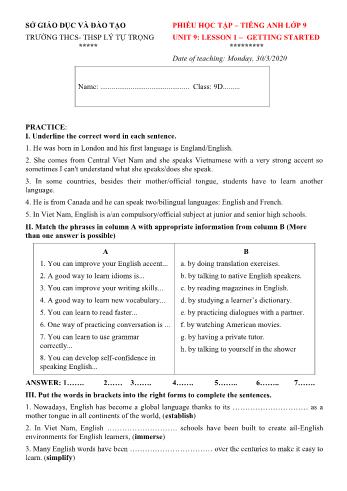Phiếu học tập môn Tiếng Anh Lớp 9 - Unit 9 - Lesson 1: Getting started - Năm học 2019-2020 - Trường THCS và THSP Lý Tự Trọng
PRACTICE:
I. Underline the correct word in each sentence.
1. He was born in London and his first language is England/English.
2. She comes from Central Viet Nam and she speaks Vietnamese with a very strong accent so
sometimes I can't understand what she speaks/does she speak.
3. In some countries, besides their mother/official tongue, students have to learn another
language.
4. He is from Canada and he can speak two/bilingual languages: English and French.
5. In Viet Nam, English is a/an compulsory/official subject at junior and senior high schools.
I. Underline the correct word in each sentence.
1. He was born in London and his first language is England/English.
2. She comes from Central Viet Nam and she speaks Vietnamese with a very strong accent so
sometimes I can't understand what she speaks/does she speak.
3. In some countries, besides their mother/official tongue, students have to learn another
language.
4. He is from Canada and he can speak two/bilingual languages: English and French.
5. In Viet Nam, English is a/an compulsory/official subject at junior and senior high schools.
Bạn đang xem tài liệu "Phiếu học tập môn Tiếng Anh Lớp 9 - Unit 9 - Lesson 1: Getting started - Năm học 2019-2020 - Trường THCS và THSP Lý Tự Trọng", để tải tài liệu gốc về máy hãy click vào nút Download ở trên.
Tóm tắt nội dung tài liệu: Phiếu học tập môn Tiếng Anh Lớp 9 - Unit 9 - Lesson 1: Getting started - Năm học 2019-2020 - Trường THCS và THSP Lý Tự Trọng

ood way to learn idioms is... 3. You can improve your writing skills... 4. A good way to learn new vocabulary... 5. You can learn to read faster... 6. One way of practicing conversation is ... 7. You can learn to use grammar correctly... 8. You can develop self-confidence in speaking English... B a. by doing translation exercises. b. by talking to native English speakers. c. by reading magazines in English. d. by studying a learner’s dictionary. e. by practicing dialogues with a partner. f. by watching American movies. g. by having a private tutor. h. by talking to yourself in the shower ANSWER: 1. 2 3. 4. 5.. 6.. 7. III. Put the words in brackets into the right forms to complete the sentences. 1. Nowadays, English has become a global language thanks to its as a mother tongue in all continents of the world, (establish) 2. In Viet Nam, English . schools have been built to create ail-English environments for English learners, (immerse) 3. Many English words have been over the centuries to make it easy to learn. (simplify) 4. New English words are being invented every day all over the world due to the free admission of words from other languages and the easy . of compounds and derivatives, (create) 5. My sister tries her best to learn English well because she has just been recruited to work for a .. company. (multination) IV. Complete the conversation about the ways to improve English, using the responses (A- H) given. A. The most important is that you should practise English all the time. B. A bilingual dictionary is your best friend while you’re learning English. C. It’s worth putting the English subtitles on so that you can read along and listen at the same time. D. If you manage to learn these then you’ll find it much easier to talk and understand conversations with native speakers. E. And don’t forget to write something every day. F. Do you have a good dictionary? G. You should use ... good way of learning pronunciation because you might recognize your mistakes at once. Duong: Sometimes I can’t follow the conversations because I don’t understand some words or phrases. Mary: Things like idioms and phrasal verbs are extremely common in everyday English conversations. (6) Duong: Good idea! Anything else? Mary: (7) .. Duong: You mean we should learn in class, at the library, in the street, and at home? Mary: That’s right. (8) .. Even if it’s only a few sentences. Duong: Thank you so much, Mary. V. Fill in each gap in the sentences with a suitable word or phrase. 1. Don't be too critical about your ____________________ — it doesn't matter if you sound like a non-native speaker. 2. Don’t worry about understanding every word, but read for the general meaning then go back and ____________________ new words. 3. I can speak basic French, so I can just about ________ ________ in French. 4. Don’t _________________ into English from your own language, but think in English to improve your fluency. 5. My father hasn’t used English for ages, so his English may be a little __________________ 6. Try to _________________ the meaning of a word from the context. 7. Ask your friend to __________________ your pronunciation when needed. 8. There is greater variety of _____________________ in Great Britain because the language developed over a millennium and a half. *******************************
File đính kèm:
 phieu_hoc_tap_mon_tieng_anh_lop_9_unit_9_lesson_1_getting_st.pdf
phieu_hoc_tap_mon_tieng_anh_lop_9_unit_9_lesson_1_getting_st.pdf

